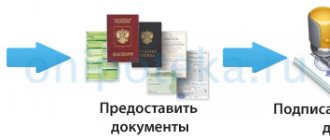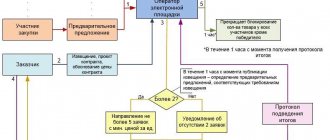What law governs the framework agreement?
The framework agreement appeared in 2015 and is regulated by Article 429.1 of the Civil Code.
Before this, a similar agreement was applied, but was called an organizational agreement, which determined the general features of the future full-fledged agreement. The framework is subject to the principles of civil law on freedom of contract, the validity of the contract, and the requirements for the form of concluding the contract. The parties enter into it free of charge, and property obligations will appear in subsequent agreements.
Law governing the framework agreement
The main provisions of the framework agreement are set out in Art. 429.1 of the Civil Code of the Russian Federation.
How is it used in procurement under 44-FZ?
According to Part 2 of Art. 34 44-FZ, the contract price is a fixed and unchangeable value, and is indicated for the entire period of fulfillment of obligations.
In Part 18 of Art. 34, pp. “b” clause 1 part 1 art. 95 44-FZ states that the quantity and volume of GWS (goods, works, services) are essential constant conditions.
Changes in these conditions are permissible within 10%, as well as within the difference between the contractor’s price and the NMCC (initial maximum contract price) in the case specified in Part 18 of Art. 34 44-FZ.
In paragraph 2 of Art. 42 44-FZ mentions a special rule that can be applied in some contracts when it is impossible to establish the scope of work or services. These are the following categories:
- maintenance and repair work on machinery and equipment;
- services: communications, legal, medical, educational, catering, translator, cargo transportation, hotel, assessment.
In such agreements, it is allowed to indicate in the notice the price of spare parts, the price per unit of service or work, and the terms of payment for actually fulfilled obligations. It is also possible to include a work schedule in the procurement documentation.
44-FZ requires mandatory indication in the contract of the price, quantity and volume of GWS, however, in some cases, the volume and quantity can be determined in the course of fulfilling obligations through customer requests.
If the contract period has expired and the obligations have not been fully fulfilled, the parties have the right to terminate the contract or count off the work actually performed.
Is it concluded within the framework of 223-FZ?
The question is ambiguous; many experts argue on this topic.
Some are of the opinion that it is impossible to conclude such an agreement within the framework of competitive procedures under 223-FZ. They explain this by the fact that in the notice under the corporate procedure it is necessary to indicate the subject, price, and volume of delivery in accordance with Parts 9, 10, Article 4 of 223-FZ.
If this information is not included in the documentation, this will be a violation of the law and will lead to fines from regulatory agencies.
Other experts say that the law does not establish a ban and a framework agreement under 223-FZ can be concluded subject to certain conditions regarding long-term cooperation with performers.
If it is necessary to carry out a number of independent purchases of goods, works and services, each of which will not exceed the designated limit, the customer can enter into a “framework” with a specific supplier.

Subsequently, each specific purchase is subject to specification within the framework of individual purchases, during which the parties can change the essential terms of the transaction:
- prices of goods, works and services;
- number of units purchased;
- terms of delivery or performance of work, as well as other provisions.
What are the requirements for a framework agreement?
The Civil Code of the Russian Federation contains only general requirements for a framework agreement. The parties have the right to determine all the rules and conditions in the document themselves. An agreement falls under the concept of a framework agreement if it specifies the general outlines of the agreement: it may not contain the names of goods or services or the amount of the agreement. In the future, the general conditions are subject to clarification and reinforcement using annexes to the contract (specifications); the parties sign them when the need for supply arises. The amount of such an agreement is the sum of all applications.
But do not confuse a framework agreement with a preliminary agreement. Under a preliminary agreement, the parties are obligated to sign an agreement in the future on the terms and conditions specified in the preliminary agreement. And if a framework agreement is concluded, in the future the parties only clarify the specific conditions using appendices to the agreement.
Concept and regulation of a framework agreement
Article 429 of the Civil Code of the Russian Federation provides that a framework agreement is an agreement that defines the general conditions of the relationship between the parties, which can be specified and clarified by the parties by concluding separate agreements, submitting applications from one of the parties, or otherwise on the basis of or in pursuance of the framework agreement. It is imperative to remember that a framework agreement implies the mandatory existence of mutual obligations of the participants.
The Framework Agreement does not guarantee that the participants will be able to reach a consensus in the future. Therefore, the parties may not achieve the desired results of legal relations in the future.
If a risk occurs, this will not affect the existence of the agreement itself, provided that the participants had no other way to make this condition certain.
The subject of the framework contract is the formation of long-term economic relations between the participants, the procedure for their further relationships. The purpose of a framework contract is to fix the initial conditions for the emergence of legal relations, as well as fix a list of issues that must be resolved by the participants in the future.
Violation of the terms of the framework contract entails legal consequences for the participants. These may be financial restrictions applied to one or all participants. Depending on the consequences, the participants may not be subject to forms of legal liability.
Taking into account the peculiarities of contracts of this category, the relations of the parties are regulated by contracts of two levels:
- the framework (main) agreements themselves;
- separate (additional, clarifying) agreements that clarify the conditions left open.
The provisions of the law, namely the articles of the Civil Code, establish a list of mandatory features of such agreements. These include:
- gratuitousness, since they do not provide for payment for goods or services;
- bilaterality, as it creates rights and obligations for both of its participants.
Some scholars and practitioners share the concepts of “framework agreement,” “open-ended agreement,” and “organizational agreement.”
In particular, some lawyers do not quite correctly call a framework agreement a developed form (standard agreement, template), which already indicates one of the parties to the agreement and its essential terms. It does not change for specific participants. That is, a framework agreement in this understanding is not an independent civil law contract, but simply a characteristic of a contract, the content of which is actually reflected in the form. This is a template agreement that a lawyer has developed for his organization and offers to all participants.
Further, an agreement with open terms is usually understood as a specific civil contract (supply, contract, paid services, etc.), which involves agreeing on its open terms in the future. What is typical for this document is that there is no need to conclude separate contracts - it is enough to fill out an application for the provision of services.
An organizational contract in this hierarchy is an agreement to organize a long-term business relationship. The subject of the contract is the establishment of general rules for interrelated activities that cannot be provided for in one-time, separate contracts.
Why do you need a framework agreement?
With the help of a framework agreement, the parties agree on long-term cooperation, certain transactions or services. The contract is concluded for a long period or for an indefinite set of supplies, services, etc.
It is often concluded if the parties cannot determine the cost of the work and its volume before the start of cooperation. Or if the parties intend to cooperate, but do not yet know the exact timing of deliveries and the start of work. Such an agreement is also concluded in order to formalize long-term business relationships in a variety of areas: regular deliveries, work or services.
The advantage of a contract is that it allows you to discuss and agree on the terms of the contract in advance. In addition, they can be flexibly changed depending on the current situation: product availability, market conditions, etc.
The framework is concluded in the following business areas:
- placing orders for municipal and state needs;
- transportation;
- trade and procurement;
- banks and lending.
Keep records of exports and imports in the Kontur.Accounting web service. Simple accounting, payroll and reporting in one service
When is it appropriate to use a framework agreement?
A framework agreement is convenient in a situation where the parties expect long-term cooperation, during which the same type of actions will be carried out repeatedly. Most often, such contracts are used in the areas of wholesale trade, production of goods to order, provision of services, etc.
A framework agreement will allow you to:
- save resources usually spent on finding a counterparty and negotiating when concluding contracts of the same type. For example, when the buyer needs the product again, he will not need to search and check the supplier, study commercial offers and negotiate. It will be enough to agree on the subject of a specific delivery with the supplier with whom the framework agreement has been concluded;
- do not agree on all terms of cooperation every time a product, work or service is required. Unlike one-time agreements, a framework agreement by default extends its terms to all transactions that the parties subsequently enter into;
- record the agreements already reached in a situation where you have not decided on the main terms of the transaction, including its subject. For example, when you do not know the exact quantity of the goods to be delivered or are still negotiating its price.
How to draw up a framework agreement
Include as many important things as possible in the frame. To avoid problems, formulate in the framework agreement the important conditions that were agreed upon: sanctions for failure to deliver and failure to meet deadlines, acceptance rules, methods of determining the price, the right to unilaterally withdraw from the contract, the procedure for filing claims. Then, in the annex to the contract, it remains to specify the specifics: assortment items, number of deliveries and their terms, payment terms, prices.
Ensure cooperation. The framework does not guarantee the conclusion of applications. And if the counterparty refuses to cooperate, he cannot be forced to do so, as is the case with a preliminary agreement.
To avoid such situations, negotiate the framework agreement carefully. For example, include a clause that the supplier must accept all bids from the buyer within certain amounts. Or, conversely, the buyer undertakes to accept all goods of proper quality from the supplier.

Don't forget about apps. Carefully draw up annexes to the contract. Often the parties carefully agree on the terms of the framework agreement, but during the next delivery they forget to draw up a specification, which in essence becomes the main agreement. And then, in case of violations by one of the parties, there will simply be no basis to hold it accountable.
Flaws in the design of the framework and applications can also lead to difficulties.
Establish a connection between the framework and the applications. Write in the frame the name of the documents in which you and the other party will establish the missing terms of the contract: application, specification, application, supply agreement. Please note: some documents require signatures of two parties (supply agreement), while some remain one-sided (application, offer). When drawing up specific documents, make sure that the name strictly corresponds to that specified in the framework agreement, and also state in each application that it forms part of the framework agreement.
How does a framework agreement differ from others from regular and preliminary agreements?
The subject of a standard contract is the provision of specific services, the implementation of a specified list of works, the supply of goods with a clearly defined range and quantity, etc. Without specifying these conditions, the contract will be considered invalid.
The preliminary agreement specifies only the subject of the future transaction (works, goods, services), while the parties to the transaction are obligated to conclude the main contract in the future.
A framework agreement for the provision of services, performance of work or supply of products establishes only the general rules of interaction between the parties for the execution of a transaction without agreeing on its subject matter. The document does not require the mandatory conclusion of a main contract in the future.
What happens when the framework is terminated
The contract ceases to be valid if there is a refusal to renew it or upon termination - and then rely on the rules for termination of the Civil Code of the Russian Federation.
Termination of the framework does not relieve the parties of existing obligations under transactions that are enshrined in the annexes to the framework. The main framework agreement and the specifications for it are independent contracts, so termination of the framework does not entail termination of the specifications, but only releases the parties from the obligation to enter into future transactions on the terms of the framework and with reference to it.
Record agreements, keep records and submit reports in the Kontur.Accounting web service. The service will save you from routine: most operations are automated. You will never forget to pay taxes on time, easily pay salaries to employees and generate reports in a few clicks. All newcomers work in the service for free for the first 14 days.
Framework agreement: what is this document?
A framework agreement is, in simple words, a document that contains the general terms of the transaction and preliminary agreements of the parties on how further cooperation will take place. The obligations of the parties can be clarified and specified by concluding separate agreements, submitting applications by one of the parties, or in any other way provided for by the framework agreement.
Drawing up a framework agreement is accompanied by certain risks. For example, the presence of ambiguous wording gives the counterparty the opportunity to evade fulfillment of obligations. An example of a framework agreement is an agreement on the construction of a building, when the text of the document states that one business entity undertakes to build a building in accordance with the requirements of another entity, but the specific work and deadlines for their completion are not indicated; they will be specified in another separate agreement.
Until June 2015, Russian legislation did not have the concept of a “framework agreement”. In practice, the parties to the transaction used a similar document - an organizational agreement. The term was introduced by law dated March 8, 2015 No. 42-FZ. The definition of a framework agreement and the procedure for its application are given in Art. 429.1 of the Civil Code of the Russian Federation.








